From vegnews.com
Burger King continues its exploration of plant-based food with Whopper-flavoured Doritos and its first meatless outpost in Denmark
Burger King is no stranger to plant-based fast food and the international chain is taking two more steps toward making animal-free food the norm. This month, Burger King announced its partnership with Doritos to create new Flame-Grilled Whopper-flavoured chips.
“We’ve been secretly working on Whopper Doritos for the past year and we’re incredibly proud to unveil this epic collaboration—in snack form,” Katie Evans, marketing director at Burger King United Kingdom, said in a statement. “We have loved developing the iconic Whopper flavor, bringing flame-grilled beef, fresh tomatoes, onions, and pickles that our customers know and love and delivering it on a Doritos tortilla chip.”
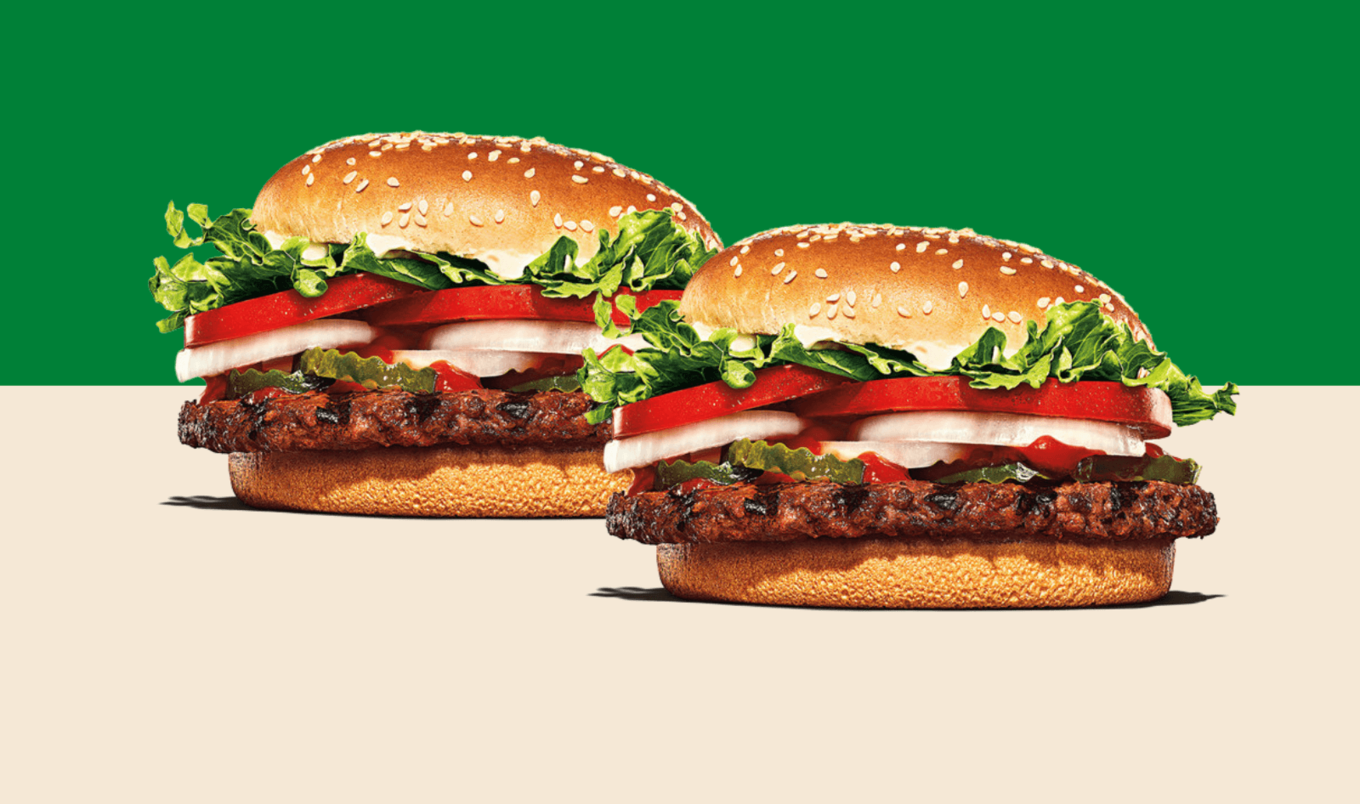
Burger King
“We’re excited for fans to try it, so they can now enjoy a Whopper wherever and whenever they want,” Evans said.
Advertised as a vegetarian-friendly snack (the ingredients of which do not contain animal products), the new Flame-Grilled Whopper chips just hit stores across the United Kingdom.
“Our shoppers are continually looking for bolder flavours and taste experiences—and this is exactly what we are giving them,” Lee-Teng Houston, UK marketing director at Doritos, said in a statement. “The new flavour adds excitement and innovation to the category, and we expect it will fly off the shelves.”
Burger King’s first plant-based restaurant in Denmark
In addition to the Whopper-flavoured Doritos, Burger King is also continuing its exploration of meatless pop-up outposts. This week, the fast-food chain transformed its Rådhuspladsen location in Copenhagen into a plant-based paradise for one month—its first trial of the concept in Denmark.
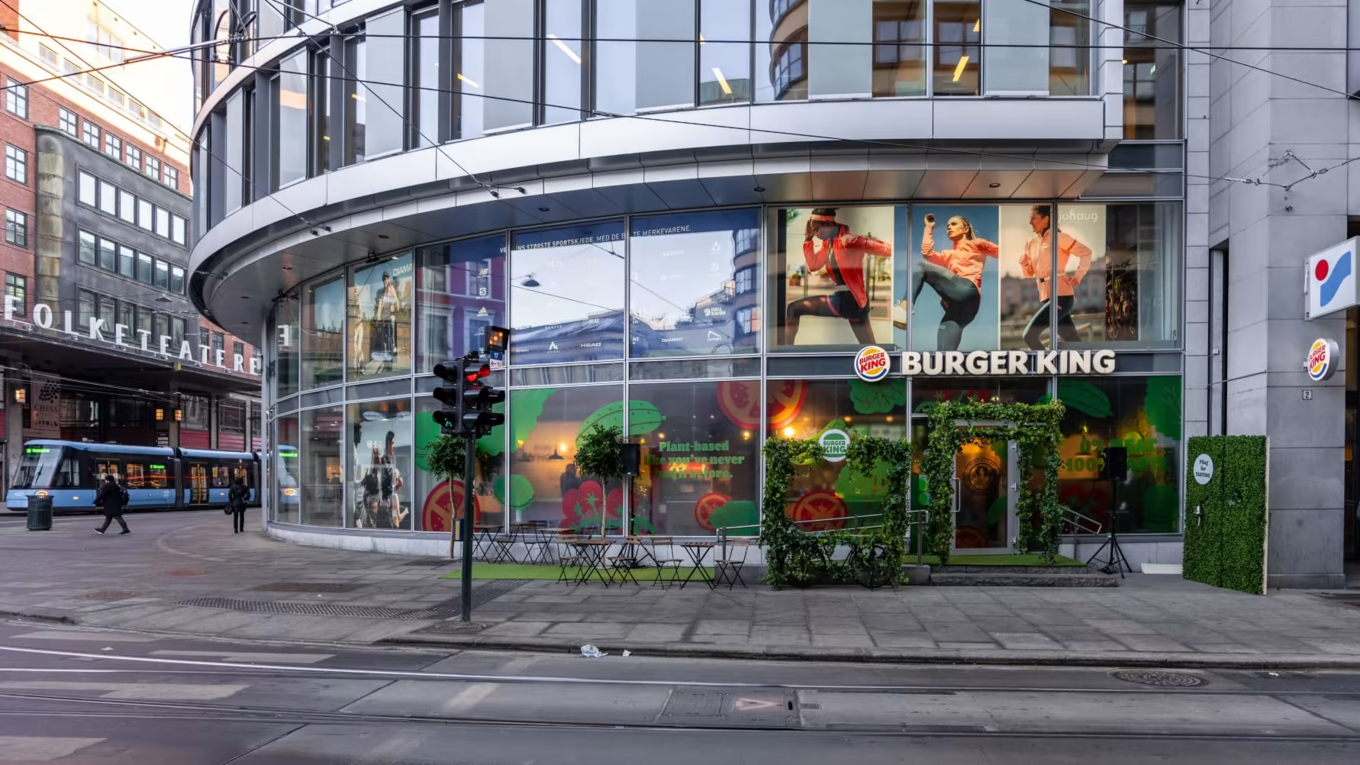 Burger King
Burger King
“We look forward to welcoming guests to our first plant-based restaurant in Denmark,” Carsten Lambrecht, Danish country manager at Burger King, said in a statement. “In the past weeks, we have opened similar concept restaurants in Sweden and Norway with great success, the Danish restaurant is meanwhile the largest of its kind in Scandinavia.”
“By opening a restaurant that only serves plant-based and meat-free alternatives, we also get a good opportunity to test products that are not yet part of our traditional menu for our further product development and innovation within the plant-based segment,” Lambrecht said.
Similar to other Burger King pop-ups, the location will serve plant-based burgers topped with Violife vegan cheese, plant-based bacon, vegan chicken, and other items made together with its European suppliers.
While the chain serves meatless items in other outposts, the new Copenhagen location’s kitchen will be free from animal products—meaning that there will be no risk of cross-contamination on shared cooking equipment.
Strangely, some sauces still contain milk and eggs but, Burger King promises, will be clearly marked on the menu.
Burger King UK adds vegan bacon cheeseburgers
At the beginning of this year, Burger King entered a whole new era of vegan fast food, one where plant-based is king. In January, Burger King added three vegan bacon cheeseburgers to its menus at participating locations across the United Kingdom—where it operates 510 outlets.
Available as a single or double, the new Plant-Based Bakon King is made with flame-grilled Plant-based Whopper patty served in a classic Whopper bun, layered with slices of vegan cheese and strips of vegan bacon, and finished with egg-free mayo and ketchup. Burger King notes that while the Plant-Based Bakon King does not contain animal-derived ingredients, its patty shares cooking equipment with meat.
Also new to the menu is the Vegan Royale Bakon King, which features a Vegan Royale patty nestled in a sesame bun, topped with vegan bacon, two slices of vegan cheese, and drizzled with egg-free mayo and ketchup. The patties are made by Burger King’s long-time plant-based supplier The Vegetarian Butcher, the vegan bacon is made by French company La Vie, and the vegan cheese is made by Violife.
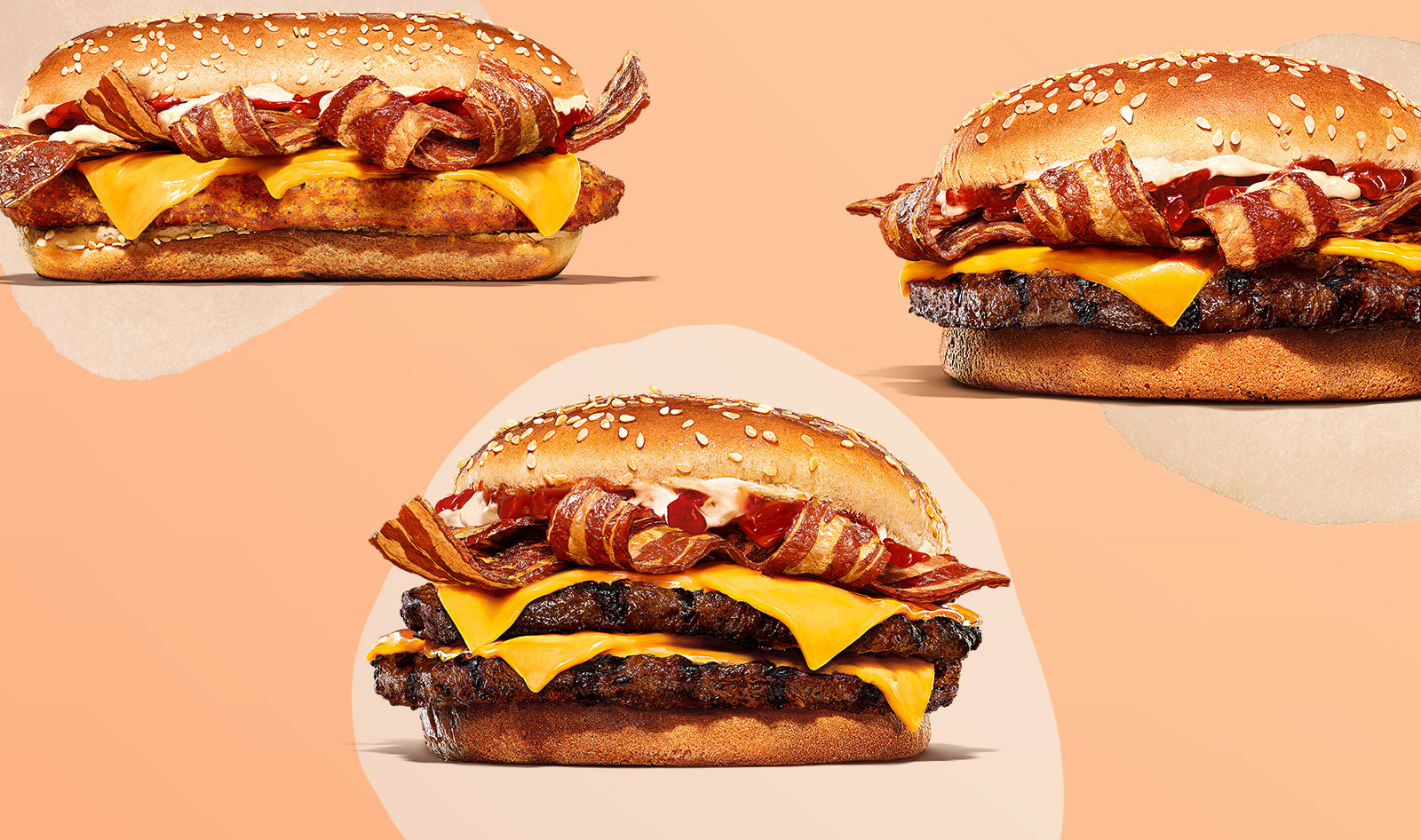
Burger King
“Whether flexitarian or vegan, we’re delighted that people looking for plant-based options will now be able to enjoy a melting slice of Violife’s plant-based cheese alternative when visiting their local Burger King,” Simon Lawrence, head of Violife Professional in Northern Europe, previously said in a statement.
The vegan bacon cheeseburgers were added to the Burger King UK menu as a result of successful meatless pop-up locations the fast-food giant held last year in London and Bristol.
“We’re incredibly proud of our new menu additions and confident that our customers will enjoy the new plant-based bacon and cheese as much as we have in taste tests,” Evans previously said in a statement.
“The extension of our plant-based offer reflects our ongoing commitment to serve a diverse and innovative range of products, whilst aiming to reach a 50 percent meat-free menu by 2030,” Evans said.
The new vegan bacon cheeseburgers hit the Burger King UK menu in time for Veganuary, an annual campaign that challenges people to go vegan for the months of January and beyond. After Veganuary, the La Vie vegan bacon remained on the Burger King UK menu permanently.
“We are very proud to be partnering with Burger King, bringing our multi-award-winning, plant-based bacon La Vie to their restaurants,” Romain Jolivet, Chief Marketing Officer at La Vie, previously said in a statement. “This will allow us to accelerate the pace of switching from animal-based meat to plant-based, which is a climate emergency we are all facing.”
Vegan bacon at Burger King
A number of fast-food chains are dipping their toes into the plant-based space with limited-time offers and test locations. Not Burger King. The international company has explored vegan food with gusto around the world. In Europe and other regions, Burger King works with The Vegetarian Butcher as its main supplier of plant-based alternatives such as its meatless Whoppers and vegan chicken.
In addition to developing plant-based versions of its core menu items, Burger King began experimenting with innovative add-ons when it added La Vie’s vegan bacon to its 550 locations in France last year.

La Vie
This happened after La Vie—which counts actress Natalie Portman as an investor—engaged the fast-food chain in a month-long campaign around the Veggie Steakhouse, Burger King’s vegan take on a classic menu item that excluded a plant-based replacement for the bacon component.
With La Vie coming to the Burger King menu in the UK, the company hopes that plant-based eating becomes even more popular. “Thanks to the open-mindedness and leadership of Burger King, proactively moving towards more plant-based options, millions of consumers will be able to try our next generation of plant-based bacon,” Jolivet said.
“With only seven ingredients and a product packed with proteins and [fibre], this is a bakon for the kings, not for the clowns,” he said in tongue-in-cheek reference to Ronald McDonald, the mascot of Burger King’s top competitor.
Burger King’s foray into plant-based food has also resulted in meatless (and sometimes all vegan) pop-ups around the world, which, in addition to the new outpost in Denmark, includes locations in Germany, Spain, the UK, Israel, Costa Rica, and more. The placement of La Vie’s bacon—first previewed to British consumers through its Bristol and London popups—on Burger King UK’s permanent menu shows that the fast-food giant is directly converting learnings from these events into new offerings.

Burger King
Outside of Europe, Burger King works with other companies to add vegan food to its menus, including in Latin America where it partnered with The Not Company (NotCo) to offer its NotChicken—plant-based chicken created with the help of artificial intelligence.
Bringing home the vegan bacon
The plant-based revolution at Burger King began in its home country in 2019 when it worked with Impossible Foods to add the first plant-based burger, the Impossible Whopper, to its more than 7,000 locations across the United States.
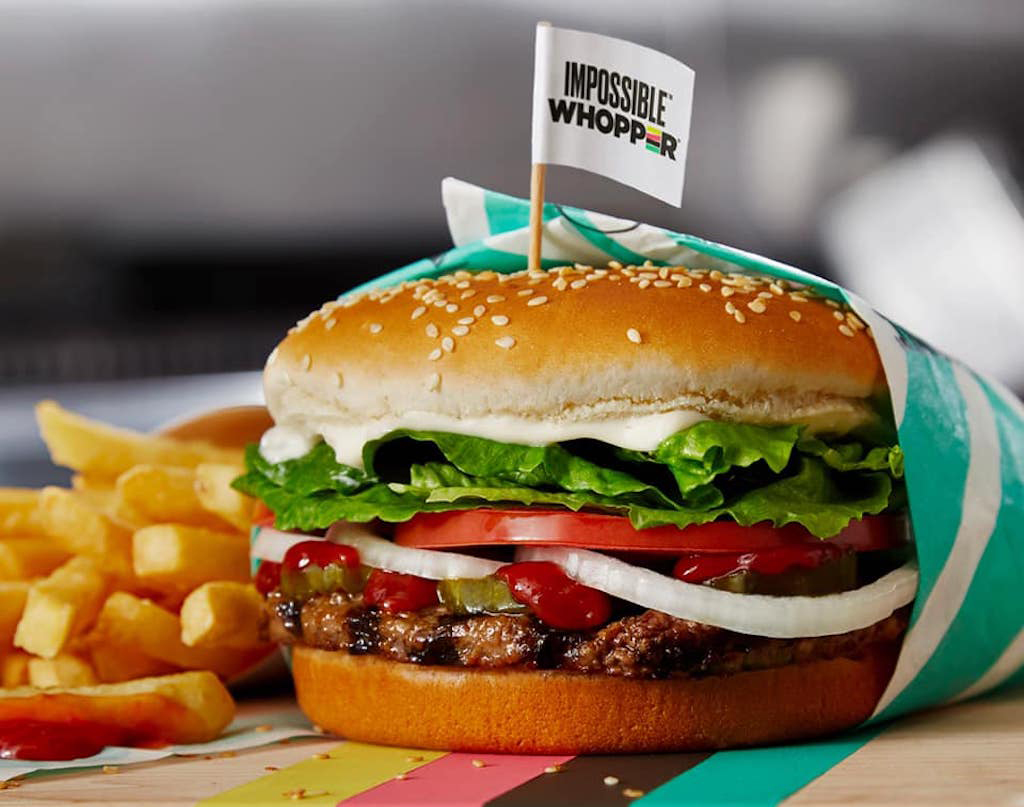
Burger King
Burger King has explored other plant-based possibilities with its longtime partner Impossible Foods—including a meatless pork-filled Croissan’wich and plant-based chicken sandwiches—but none have seemed to stick yet. While Burger King’s plant-based developments abroad are vast and growing, the fast-food chain has yet to add vegan bacon to its US menu. For its part, Impossible Foods teased the development of a vegan bacon back in 2020 but that product has yet to materialize.
However, new entrants into the plant-based bacon space might move that needle forward. California-based Hooray Foods released a meatier vegan bacon this summer and expanded its retail distribution to Canada.
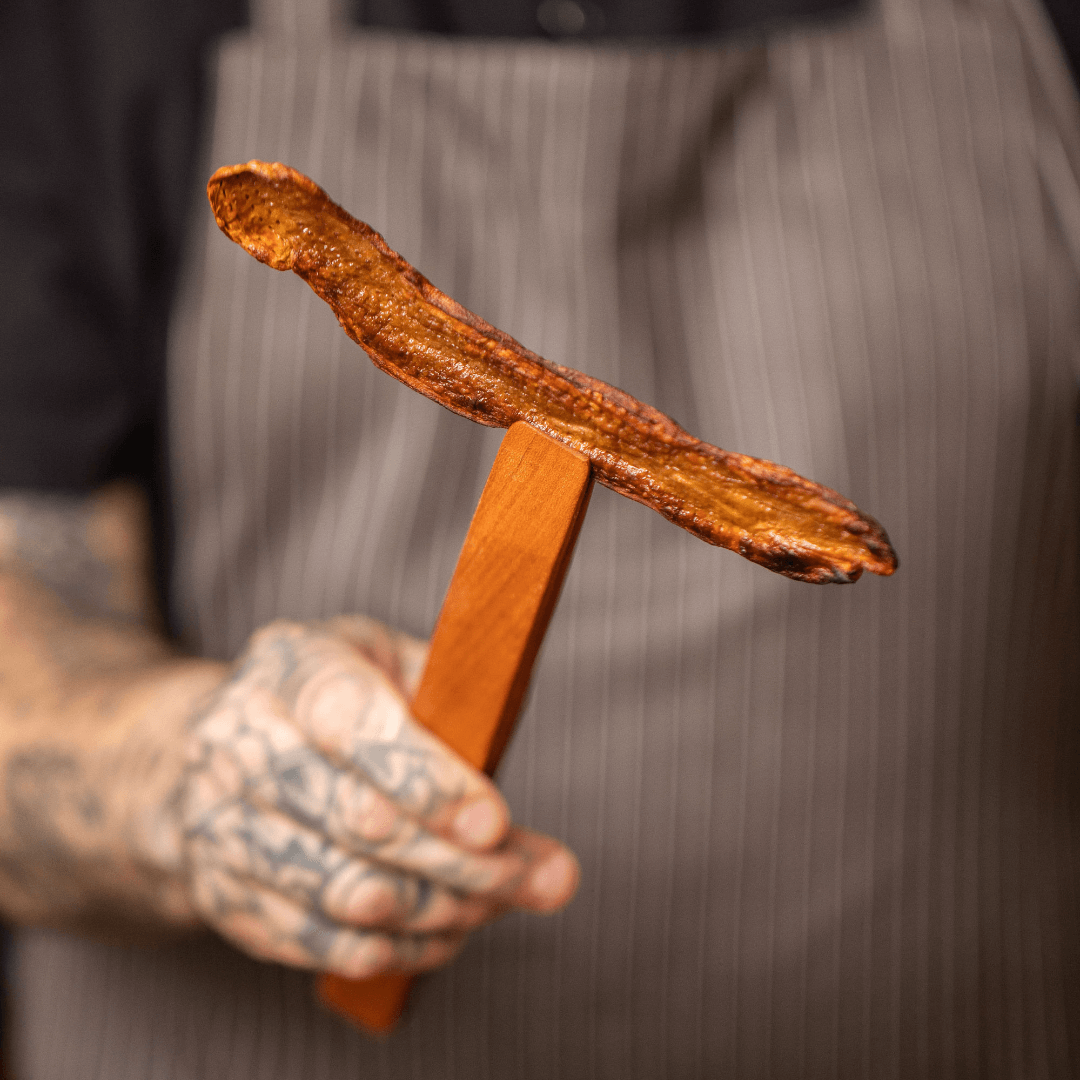
My Forest Foods
Meanwhile, New York-based MyForest Foods—which makes its MyBacon from mycelium, the fast-growing roots of mushrooms—is slated to scale production at a newly opened Swersey Silos, a 120,000-square-foot vertical mycelium farm.
And then there is Umaro Foods, a Mark Cuban-backed company that makes bacon from umami-rich seaweed protein began rolling out last year into foodservice, including at Michelin-starred San Francisco restaurant Sorrel.











